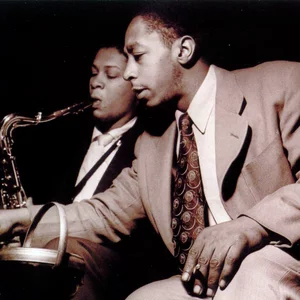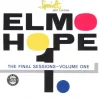Biography Elmo Hope
St. Elmo Sylvester Hope (born June 27, 1923–died May 19, 1967) was an American jazz pianist, performing chiefly in the bop and hard bop genres. His highly individual piano-playing and, especially, his compositions have led a few enthusiasts and critics such as David Rosenthal to place him alongside his contemporaries Bud Powell and Thelonious Monk (one could also compare him to Herbie Nichols); but he remains still comparatively underrecognized.
He began his career with the Joe Morris band. From 1953 on he recorded in New York as a leader and with Sonny Rollins, Lou Donaldson, Clifford Brown, and Jackie McLean, but moved to Los Angeles in 1957 after losing his cabaret card for drug use. He performed with Chet Baker before moving, and with Lionel Hampton after, and recorded with Harold Land and Curtis Counce. He also recorded as a leader with Frank Foster, John Coltrane, Hank Mobley, Art Blakey, Paul Chambers, and Philly Joe Jones. Hope recorded on a number of occasions in the trio format and more rarely as a leader of a quintet for Blue Note, Prestige, Riverside and other labels.
Disillusioned with the West Coast scene, Hope returned to New York in 1961, where he went to prison briefly on drug charges then returned to playing, but recorded more rarely. His wife Bertha (Rosamond) Hope (born November 8, 1936) also a pianist, participated in a duo recording with her husband in 1961 and has released albums dedicated to her late spouse's compositions.
Later pianists who cite Hope as their main influence include bebop pianists Frank Hewitt (1935-2002), and Sacha Perry.
Overshadowed throughout his life by his friends Bud Powell and Thelonious Monk, Elmo Hope was a talented pianist and composer whose life was cut short by drugs. His first important gig was with Joe Morris' R&B band (1948-1951). He recorded in New York as a leader (starting in 1953) and with Sonny Rollins, Lou Donaldson, Clifford Brown, and Jackie McLean, but the loss of his cabaret card (due to his drug use) made it very difficult for him to make a living in New York. After touring with Chet Baker in 1957, Hope relocated to Los Angeles. He performed with Lionel Hampton in 1959, recorded with Harold Land and Curtis Counce, and returned to New York in 1961. A short prison sentence did little to help his drug problem and, although he sounds fine on his trio performances of 1966, he died a little over a year later. Elmo Hope's sessions as a leader were cut for Blue Note, Prestige, Pacific Jazz, Hi Fi Jazz, Riverside, Celebrity, Beacon, and Audio Fidelity; his last albums were initially released on Inner City. Hope was also a fine composer, although none of his songs became standards. ~ Scott Yanow, Rovi
Creative Commons By-SA License
 FM
FM


